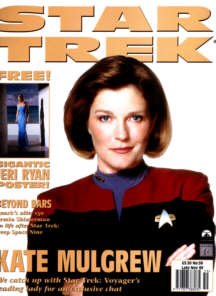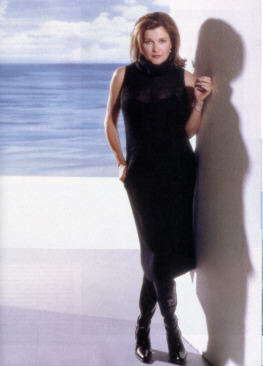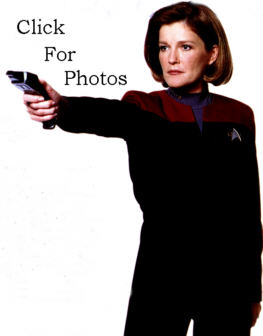 |
NOVEMBER 1999 KATE
MULGREW
|
 |
NOVEMBER 1999 KATE
MULGREW
|
|
COMMAND AND CONQUER
|
 |
 The
key word for me is relaxation,” proclaims Kate Mulgrew, describing her
mental state as she launches into Star Trek: Voyager’s sixth triumphant
season. “It’s very difficult to describe this to someone who is not an
actor, but there’s an extraordinary kind of pressure in camera work for
me that does not exist in the theatre. And initially, when I got this role,
it was a pretty exacting affair, not because they applied the pressure
to me —I think I applied it to myself. I knew I was the first woman going
into [the captain’s] seat, that I needed to equip myself not only well
but thoroughly originally if possible, and all of those feelings and ancillary
pressures conspired to make me feel, I think, not as relaxed as I like
to feel when I’m acting. So, as the years have gone on, it’s evolved into
something altogether different, and as we walk into the sixth season, I
would say that I feel that I own her now, which is a wonderfully freeing
and delicious feeling for an actress to have about the character she’s
playing.
The
key word for me is relaxation,” proclaims Kate Mulgrew, describing her
mental state as she launches into Star Trek: Voyager’s sixth triumphant
season. “It’s very difficult to describe this to someone who is not an
actor, but there’s an extraordinary kind of pressure in camera work for
me that does not exist in the theatre. And initially, when I got this role,
it was a pretty exacting affair, not because they applied the pressure
to me —I think I applied it to myself. I knew I was the first woman going
into [the captain’s] seat, that I needed to equip myself not only well
but thoroughly originally if possible, and all of those feelings and ancillary
pressures conspired to make me feel, I think, not as relaxed as I like
to feel when I’m acting. So, as the years have gone on, it’s evolved into
something altogether different, and as we walk into the sixth season, I
would say that I feel that I own her now, which is a wonderfully freeing
and delicious feeling for an actress to have about the character she’s
playing.
“I feel so happy with my company,” Mulgrew enthuses, referring to the positive working atmosphere of the ST:VOY cast and crew. “My working environment is jolly most of the time, and even when it’s not jolly it’s loving and very affectionate. We’re all terrific friends, and I can’t say that I could say that about many of my other experiences in the past. So the environment is great, the quality of relaxation is deeper than it’s ever been and the writing is edgier.
“[Executive Producer] Brannon Braga is an enormously talented young guy with, I’ve said this before, a very provocative edge to his thinking, which translates into his writing,” she continues. “I’ve often cited [Co-Executive Producer] Joe Menosky as our resident genius, and the whole thing is overseen by Mr [Rick, Star Trek’s Executive Producer] Berman, who has not made this a great success for nothing. For many years, he’s watched this with a keen and clever eye. He’s a perfectionist. He understood Roddenberry’s concept. He still believes in the dream. And so I feel altogether very, very good and very, very lucky to be going into it.
One noteworthy feature of season six is that, with Star Trek: Deep Space Nine now out of production, ST:VOY is the only new Star Trek show on the air. So does the absence of their sister series affect Mulgrew and the rest of the cast? “Well, I’m sure it does in a business sense, but I’m so out of that,” she admits. “It’s quieter on the street. Let me put it to you that way. It’s a quieter alley, and I guess selfishly, it’s nice to be the only kid in the family. I would hope that we would draw some of that viewing audience, but I think we’ve got an even more exciting political challenge ahead of us, which is that we want to broaden our viewing base altogether. So I think to stand alone is a very good thing for at least one year.”
Speaking of standing alone, Kate got her taste of that in the season six premiere, Equinox, Part II, which sees Captain Janeway once again driven to a course of action against the opinions of her crew. “It’s not Janeway against the crew, but it is some times Janeway alone,” Mulgrew clarifies, “because I am the captain, and in this case, I’m going head to head with a captain who has resigned his ethics. For some reason that drives me to a certain kind of behaviour that I don’t otherwise employ. I do become myopic in my pursuit of him, in my diligence and my absolute commitment to bringing him down, if you want to use that expression. All of which turns around at the end. Indeed, I feel that he has betrayed all that I stand for, and having been lost now for six years, it is a particularly provocative and dangerous dilemma to find myself in.”
On one of the previous occasions when Janeway followed her conscience into solo waters, Voyager wound up with a new crew member Seven of Nine. Now, three seasons into Seven and the captain’s very maternal relationship, Mulgrew sees the interweaving of the two characters as progressing very well.
“We just had a wonderful time together last Friday night. Jeri and I have found so many wonderful ways for this relationship to not only work for us but between us. There’s a real vulnerability to Seven which is so attractive to me, not only as a person, but also as the captain. And then there’s her development. I just finished reading ‘Conversations with Nobel Scientists’, in which Richard Feynman says that if you view Star Trek you will see that the single greatest achievement that it has to contribute to our society is the acknowledgement that in the future there will be such a thing as an advanced intelligence. You could call it robotic, but it will certainly be a vast and sort of impenetrable intelligence. This is the kind of intelligence that we’ll be sending to space sooner or later to do all of our work for us.
“I think Seven embodies that concept — which is thrilling for me, because anything we can do that’s based in reality is heartening, to say the least — combined with her natural and Human vulnerability and her confusion. The fact is that in this very beauiful, grown-up female body and face, right behind this canvas, lies a young girl who’s not had any of the opportunities to evolve as we have as Human beings. Obviously, she’s shown that it’s been a terrific achievement, both by the writing staff and the science fiction end of it. So I’m very happy with her and with the work that we get to do, and we get to do a lot of it.”
Considering Mulgrew’s description of Seven, the journalist is reminded of Professor Stephen Hawking’s words at a recent White House dinner, during which the famous physicist announced that he wasn’t afraid of competition from intelligent computers because he foresaw Humanity upgrading themselves to the level of those computers. “Exactly,” exclaims Mulgrew. “But you know, I doubt that that can ever happen. We will become the computers which we will oversee. We will always be in command of these computers, but it will be something that you and I... well, you can’t really imagine it.
“Physicists have studied this for so many years, and they definitely see it as the future. The whole thing is sort of disturbing to me, but obviously we’re going there, aren’t we? We’re getting conversational computers and the Internet has captured the imagination of the world in a way that I have not seen in my lifetime. We are at an age and at a time to experience one of the most exciting, if not epic, transitions in the history of the world.”
One of the unintentional and ongoing threads woven through Star Trek: Voyager’s sixth season has been the way that the show plays with reality and identity. More so than any previous incarnation of Star Trek, the writers frequently explore stories in which we are dealing with an alternate version of the crew — episodes focusing on illusory, parallel, artificial, or even holographic doppelgangers. Is this a result of the increased presence of the Internet - a breaking down in society’s perceived barriers in what is real and what is virtual?
“Oh, absolutely,” states Mulgrew. “And what does that mean to our culture? What does that mean to our society? Are we all Frankensteins? I think that the physicists who I’ve been reading would posit that there is a very collective, natural instinct in man to be a Frankenstein. This, of course, can bite you on the you-know-what, but we have to wait and see how badly it bites us before we cease to [progress].
“You know, the whole thing, to me, is sort of comparable to what happened at Los Alamos in the Thirties, with the Oppenheimer group. Those guys really did not understand what they were undertaking, and when they did understand it, it was too late. Nonetheless, they have revealed atomic energy to science and to history, for the rest of time, and that has altered all of our thinking. That has altered, in fact, what we do with the physical world.
‘And that is exactly what we’re doing with computers right now. Of course, they’re just in a nascent state. If I live to be a 90-year-old woman, I won’t see it but my boys will see it and my grandchildren will see the most remarkable by-products of this imagination combined with science.”
So, they’ll see something like a holodeck? Which brings us nicely to a discussion of Tinker, Tenor, Doctor, Spy, a hilarious episode that sees the holographic doctor consumed by his holographic fantasy life. “I would say we’ve got an Oscar-winner right there,” enthuses Mulgrew. “Bob Picardo is a very dear friend of mine, and probably without question one of the most talented people I know. In every area, on every level that is crucial to great acting, he is extremely intelligent, and he applies his intelligence to his imagination.
“The guy took this role six years ago with very little concept behind it, and in Tinker, Tenor, Doctor, Spy the doctor is becoming obsessed with his own fantasies. His fantasies have taken over his sentient reality as a hologram, and all the women are in love with him, and then he’s the captain of the ship, and he’s a brilliant opera singer. It’s just delicious. It’s a joyful feast, and certainly no one could have done it as Bob did.
“I just remember one scene in particular where we are laughing so hard that we could hardly shoot the damn thing,” Mulgrew recalls. “All the women are after him in a briefing room scene at a conference. B’Elanna is rubbing his leg under the table and Seven is flashing him on the PADD and I am stroking his neck and telling him that he must stay with me and attend to my bad back, and I put his hand right on the area of my bad back which isn’t a back at all. So it’s all about how everybody adores him and he’s the most wonderful person who ever lived.
“The essence of the story — let’s see who wrote this, ah, once again, my friend Joe Menosky — is that the doctor, who has now acquired sentience, feels a deep need to be appreciated, that the holographic personality, for lack of a better phrase, will always suffer an insecurity that the Humans will not, because of course he’s been given Humanity by the Humans. So in his heart, in his thinking, he wishes to be acknowledged not only for his existence on Voyager, but for his contributions to the ship. These fantasies are a direct product of those very Human longings, and Joe ties it together in such a poignant way. Sometimes I have a terrible pride in the work that we do, and I had a terrible pride about this.”
|
|
|
|